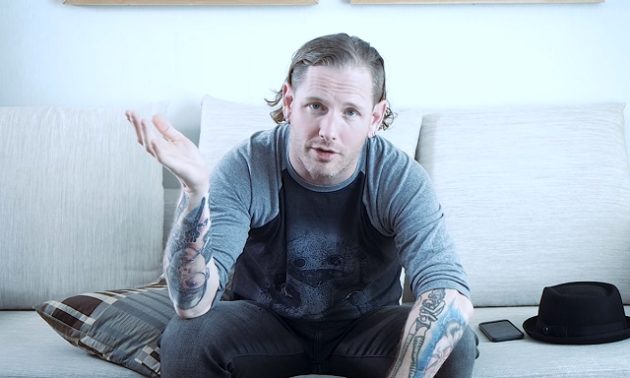
Corey Taylor said that the people who have called Chester Bennington and Chris Cornell “cowards” for taking their own lives, saying that such criticism is “simplifying a very real issue.”
The suicides of these two high-profile musicians drew serious critics, all of whom wondered how someone could do something so extremely “selfish.” That included KORN guitarist Brian “Head” Welch, who blasted Bennington as a “coward” for leaving six kids and a family behind.
In a brand new interview with Loudwire, Taylor, who has always been very open about his battle with depression and the natural ways he tries to combat it, was asked for his opinion on some people’s insistence that suicide is an act of cowardice.
“Calling them ‘cowards’ is a very immature way of looking at it,” Taylor said (see video below). “Obviously, [the people who are saying that are] hurt, which is why they’re lashing out and saying that. It’s the easy way to look at something like that, because it makes you not have to face what a serious issue it is. It’s easy for someone to label it like that so they can turn their back on it and pretend that it was something that didn’t happen to them, when inside they’re hurting.”
He continued: “People who fight depression are almost in a constant state of hurting. It comes and goes. The tide rises, the tide ebbs, and sometimes it’s hard to get past that break.”
Taylor reiterated that calling people like Bennington and Cornell “cowards” is “not only immature, but it’s also a cop-out. It’s needlessly — needlessly — simplifying a very real issue,” he explained. “An issue that might have a lot to do with a lot of the other issues that are going on in our country right now. Whether it’s suicide or the opioid problem that’s going on right now, people don’t wanna feel. Why do they not wanna feel? Let’s get to the bottom of that. Let’s get to the bottom of why there is a rise in not only PTSD, but severe depression across the board.”
Corey pointed out that he personally suffers from manic depression, “which means I rise and fall, I crash and I burn,” he said. “I’ve got the practice and I’ve got the people to talk to so I can keep myself from really breaking myself against that wall. But it’s tough, man. It’s tough. And some people don’t have that luxury. Some people, like our friends, the wall pushes back, and it is a goddamn tragedy. That does not make them cowards. I’ve even heard people recently say something to the fact of, ‘It was bound to happen. This was always going to happen.’ And I’ve gotten so angry hearing that that I’ve gone on record as saying that ‘you are absolutely wrong for saying that.'”
According to Taylor, suicide should never be a foregone conclusion. “That means you’re not listening,” he said. “You say you care about that person? That means you’re not listening. So I’m listening. So I’m doing everything I can to make sure that people know that there are people out there listening. There are places to go. Whether it’s a friend or a stranger, there are organizations, there are centers, there are people who are dedicated to listening. Because sometimes that’s all you need — just someone to listen. It’s not gonna change the severity of it, but it’s gonna help you feel a little better. It will take away that solitary confinement. It will take away that sense that you’re alone. You’re not. You’re not alone. Not one person out there who feels that way is alone. I feel it, I’m sure you know people who feel it, or you feel it. You’re not alone. And it is important for people to know that. You’re not a coward. You’re not alone. Get the help you need. There are ways to find it.”
The LINKIN PARK singer was found dead late last month at his home in Southern California. A Los Angeles County coroner confirmed that the cause of death was “suicide by hanging.”
After Cornell committed suicide in May, Bennington sang at his funeral and also wrote a heartfelt message paying tribute to the SOUNDGARDEN frontman.
Chester died on July 20, which would have been Cornell‘s 53rd birthday.